Organisational Behaviour Report: Tesco, Teamwork and Motivation
VerifiedAdded on 2023/01/11
|16
|4947
|46
Report
AI Summary
This report provides a comprehensive analysis of organisational behaviour, specifically focusing on the case study of Tesco. It delves into how organisational culture, politics, and power dynamics influence individual and team performance within the company. The report explores various content and process theories of motivation, including Herzberg's theory, Maslow's hierarchy of needs, and Vroom's expectancy theory, and how these theories are applied within Tesco. It also compares effective and ineffective team characteristics and examines the impact of organisational philosophies on different business situations. The report highlights the importance of cultural awareness, the influence of globalisation and technology, and the use of intrinsic and extrinsic motivation. Overall, the report aims to provide insights into how Tesco manages its workforce, fosters innovation, and achieves its business objectives through effective organisational behaviour strategies.
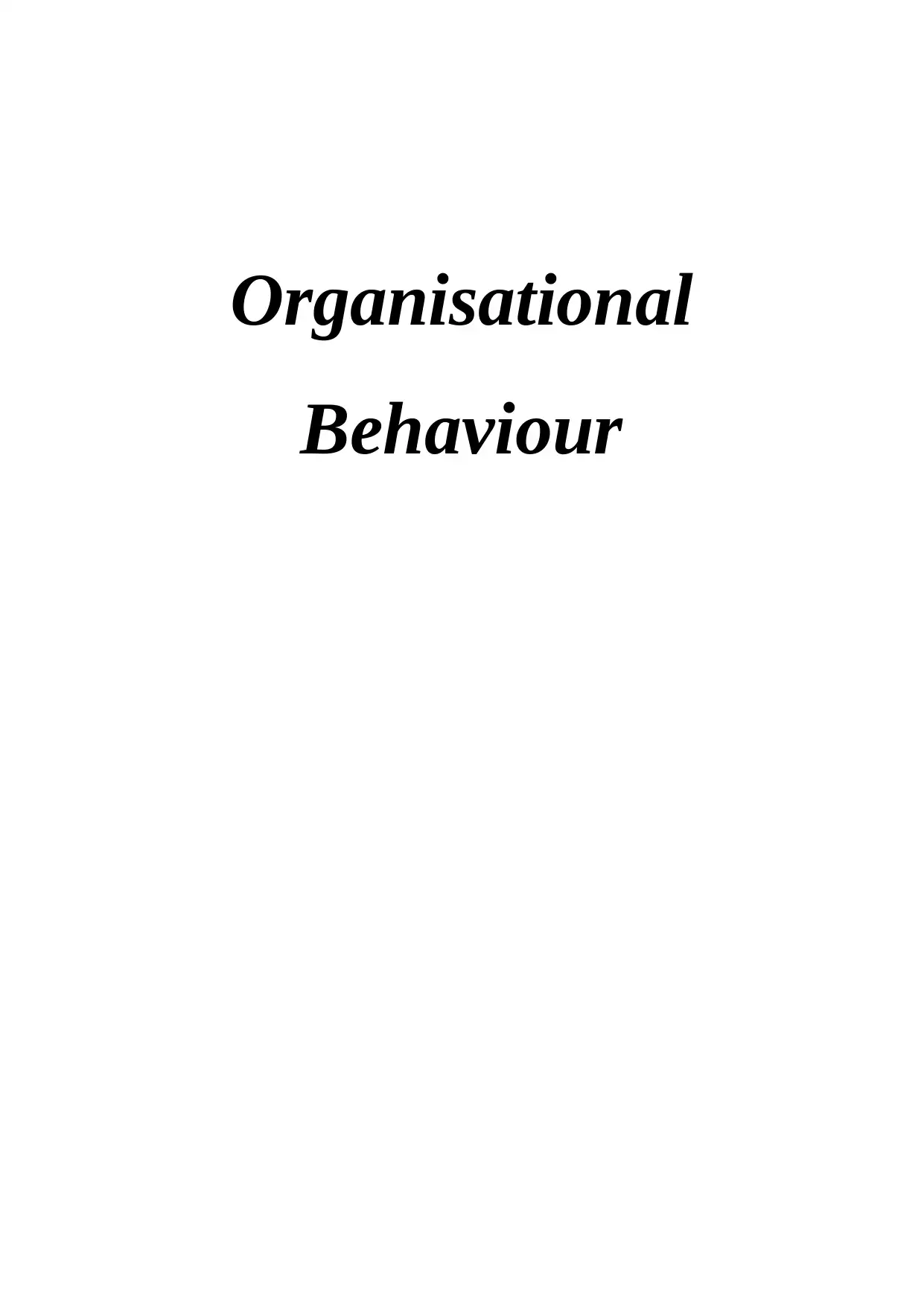
Organisational
Behaviour
Behaviour
Paraphrase This Document
Need a fresh take? Get an instant paraphrase of this document with our AI Paraphraser
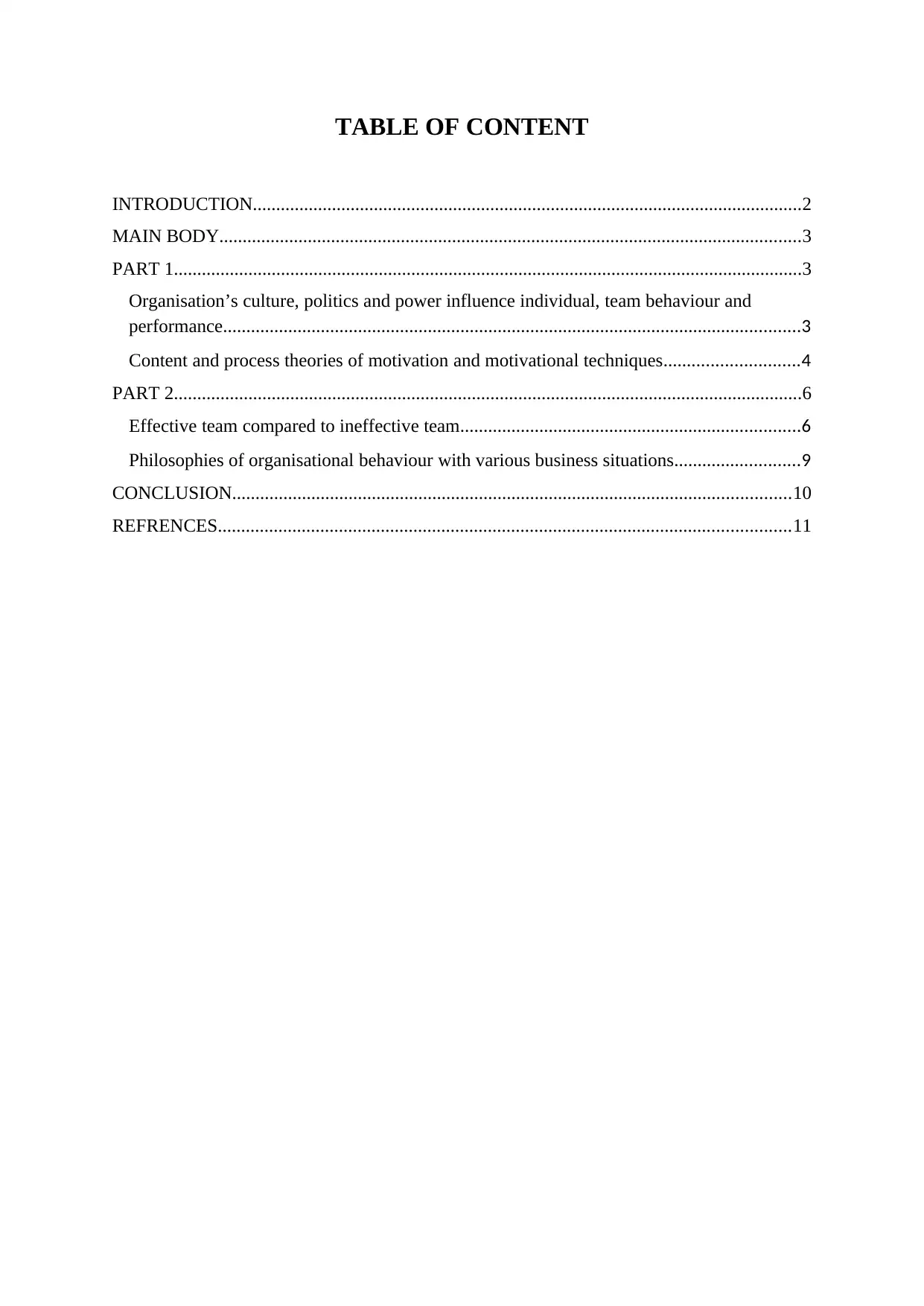
TABLE OF CONTENT
INTRODUCTION......................................................................................................................2
MAIN BODY.............................................................................................................................3
PART 1.......................................................................................................................................3
Organisation’s culture, politics and power influence individual, team behaviour and
performance............................................................................................................................3
Content and process theories of motivation and motivational techniques.............................4
PART 2.......................................................................................................................................6
Effective team compared to ineffective team.........................................................................6
Philosophies of organisational behaviour with various business situations...........................9
CONCLUSION........................................................................................................................10
REFRENCES...........................................................................................................................11
INTRODUCTION......................................................................................................................2
MAIN BODY.............................................................................................................................3
PART 1.......................................................................................................................................3
Organisation’s culture, politics and power influence individual, team behaviour and
performance............................................................................................................................3
Content and process theories of motivation and motivational techniques.............................4
PART 2.......................................................................................................................................6
Effective team compared to ineffective team.........................................................................6
Philosophies of organisational behaviour with various business situations...........................9
CONCLUSION........................................................................................................................10
REFRENCES...........................................................................................................................11
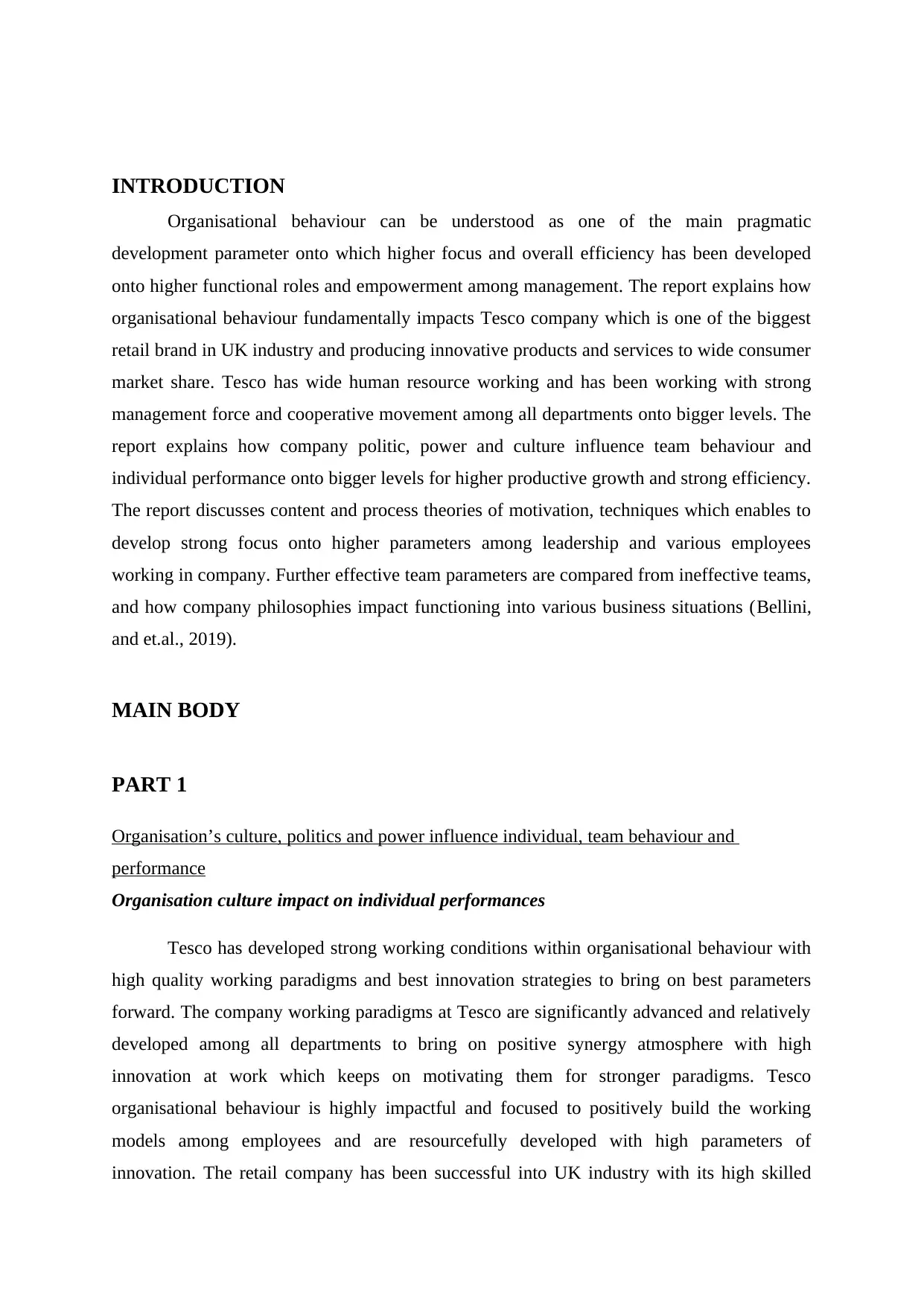
INTRODUCTION
Organisational behaviour can be understood as one of the main pragmatic
development parameter onto which higher focus and overall efficiency has been developed
onto higher functional roles and empowerment among management. The report explains how
organisational behaviour fundamentally impacts Tesco company which is one of the biggest
retail brand in UK industry and producing innovative products and services to wide consumer
market share. Tesco has wide human resource working and has been working with strong
management force and cooperative movement among all departments onto bigger levels. The
report explains how company politic, power and culture influence team behaviour and
individual performance onto bigger levels for higher productive growth and strong efficiency.
The report discusses content and process theories of motivation, techniques which enables to
develop strong focus onto higher parameters among leadership and various employees
working in company. Further effective team parameters are compared from ineffective teams,
and how company philosophies impact functioning into various business situations (Bellini,
and et.al., 2019).
MAIN BODY
PART 1
Organisation’s culture, politics and power influence individual, team behaviour and
performance
Organisation culture impact on individual performances
Tesco has developed strong working conditions within organisational behaviour with
high quality working paradigms and best innovation strategies to bring on best parameters
forward. The company working paradigms at Tesco are significantly advanced and relatively
developed among all departments to bring on positive synergy atmosphere with high
innovation at work which keeps on motivating them for stronger paradigms. Tesco
organisational behaviour is highly impactful and focused to positively build the working
models among employees and are resourcefully developed with high parameters of
innovation. The retail company has been successful into UK industry with its high skilled
Organisational behaviour can be understood as one of the main pragmatic
development parameter onto which higher focus and overall efficiency has been developed
onto higher functional roles and empowerment among management. The report explains how
organisational behaviour fundamentally impacts Tesco company which is one of the biggest
retail brand in UK industry and producing innovative products and services to wide consumer
market share. Tesco has wide human resource working and has been working with strong
management force and cooperative movement among all departments onto bigger levels. The
report explains how company politic, power and culture influence team behaviour and
individual performance onto bigger levels for higher productive growth and strong efficiency.
The report discusses content and process theories of motivation, techniques which enables to
develop strong focus onto higher parameters among leadership and various employees
working in company. Further effective team parameters are compared from ineffective teams,
and how company philosophies impact functioning into various business situations (Bellini,
and et.al., 2019).
MAIN BODY
PART 1
Organisation’s culture, politics and power influence individual, team behaviour and
performance
Organisation culture impact on individual performances
Tesco has developed strong working conditions within organisational behaviour with
high quality working paradigms and best innovation strategies to bring on best parameters
forward. The company working paradigms at Tesco are significantly advanced and relatively
developed among all departments to bring on positive synergy atmosphere with high
innovation at work which keeps on motivating them for stronger paradigms. Tesco
organisational behaviour is highly impactful and focused to positively build the working
models among employees and are resourcefully developed with high parameters of
innovation. The retail company has been successful into UK industry with its high skilled
⊘ This is a preview!⊘
Do you want full access?
Subscribe today to unlock all pages.

Trusted by 1+ million students worldwide
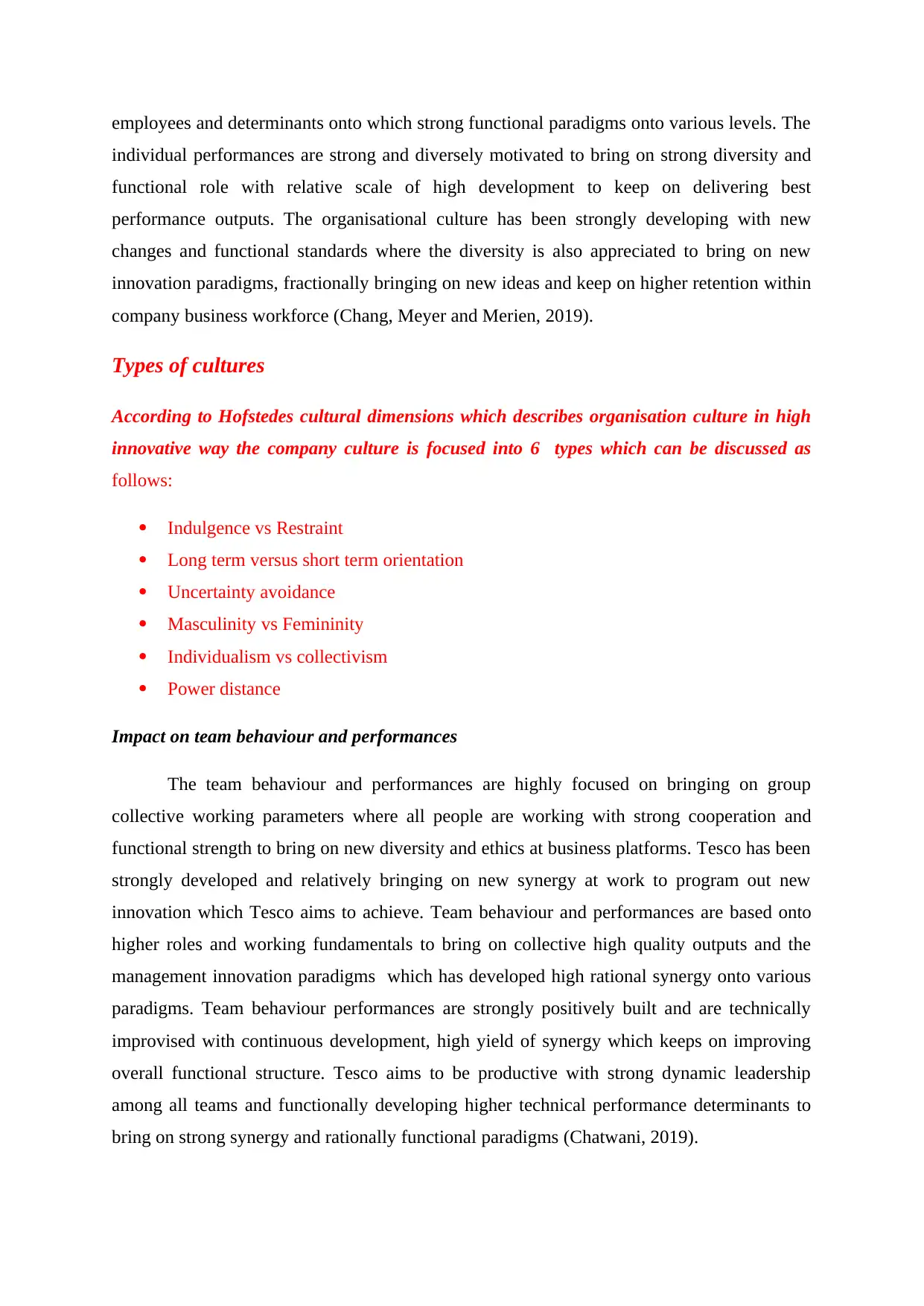
employees and determinants onto which strong functional paradigms onto various levels. The
individual performances are strong and diversely motivated to bring on strong diversity and
functional role with relative scale of high development to keep on delivering best
performance outputs. The organisational culture has been strongly developing with new
changes and functional standards where the diversity is also appreciated to bring on new
innovation paradigms, fractionally bringing on new ideas and keep on higher retention within
company business workforce (Chang, Meyer and Merien, 2019).
Types of cultures
According to Hofstedes cultural dimensions which describes organisation culture in high
innovative way the company culture is focused into 6 types which can be discussed as
follows:
Indulgence vs Restraint
Long term versus short term orientation
Uncertainty avoidance
Masculinity vs Femininity
Individualism vs collectivism
Power distance
Impact on team behaviour and performances
The team behaviour and performances are highly focused on bringing on group
collective working parameters where all people are working with strong cooperation and
functional strength to bring on new diversity and ethics at business platforms. Tesco has been
strongly developed and relatively bringing on new synergy at work to program out new
innovation which Tesco aims to achieve. Team behaviour and performances are based onto
higher roles and working fundamentals to bring on collective high quality outputs and the
management innovation paradigms which has developed high rational synergy onto various
paradigms. Team behaviour performances are strongly positively built and are technically
improvised with continuous development, high yield of synergy which keeps on improving
overall functional structure. Tesco aims to be productive with strong dynamic leadership
among all teams and functionally developing higher technical performance determinants to
bring on strong synergy and rationally functional paradigms (Chatwani, 2019).
individual performances are strong and diversely motivated to bring on strong diversity and
functional role with relative scale of high development to keep on delivering best
performance outputs. The organisational culture has been strongly developing with new
changes and functional standards where the diversity is also appreciated to bring on new
innovation paradigms, fractionally bringing on new ideas and keep on higher retention within
company business workforce (Chang, Meyer and Merien, 2019).
Types of cultures
According to Hofstedes cultural dimensions which describes organisation culture in high
innovative way the company culture is focused into 6 types which can be discussed as
follows:
Indulgence vs Restraint
Long term versus short term orientation
Uncertainty avoidance
Masculinity vs Femininity
Individualism vs collectivism
Power distance
Impact on team behaviour and performances
The team behaviour and performances are highly focused on bringing on group
collective working parameters where all people are working with strong cooperation and
functional strength to bring on new diversity and ethics at business platforms. Tesco has been
strongly developed and relatively bringing on new synergy at work to program out new
innovation which Tesco aims to achieve. Team behaviour and performances are based onto
higher roles and working fundamentals to bring on collective high quality outputs and the
management innovation paradigms which has developed high rational synergy onto various
paradigms. Team behaviour performances are strongly positively built and are technically
improvised with continuous development, high yield of synergy which keeps on improving
overall functional structure. Tesco aims to be productive with strong dynamic leadership
among all teams and functionally developing higher technical performance determinants to
bring on strong synergy and rationally functional paradigms (Chatwani, 2019).
Paraphrase This Document
Need a fresh take? Get an instant paraphrase of this document with our AI Paraphraser
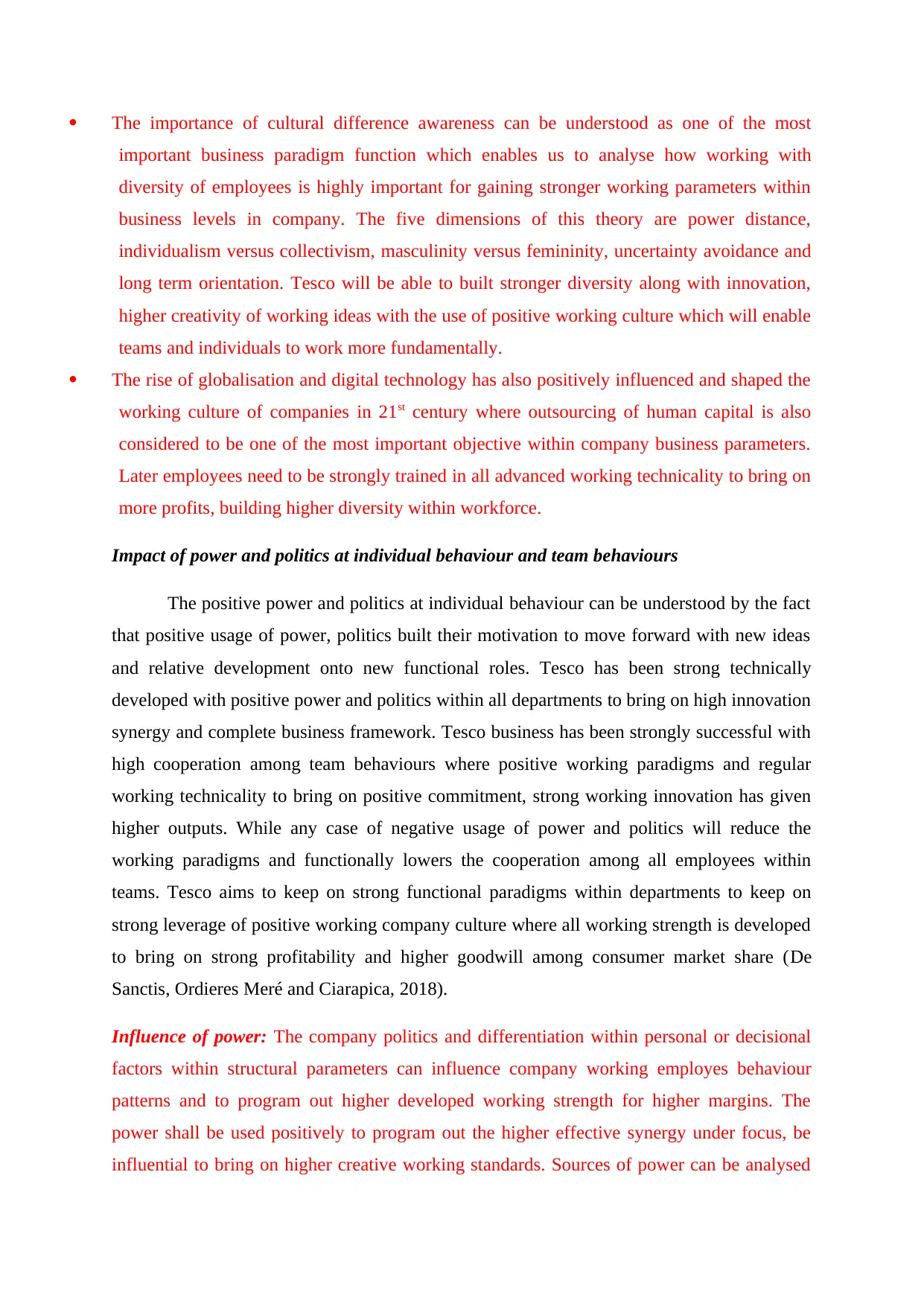
The importance of cultural difference awareness can be understood as one of the most
important business paradigm function which enables us to analyse how working with
diversity of employees is highly important for gaining stronger working parameters within
business levels in company. The five dimensions of this theory are power distance,
individualism versus collectivism, masculinity versus femininity, uncertainty avoidance and
long term orientation. Tesco will be able to built stronger diversity along with innovation,
higher creativity of working ideas with the use of positive working culture which will enable
teams and individuals to work more fundamentally.
The rise of globalisation and digital technology has also positively influenced and shaped the
working culture of companies in 21st century where outsourcing of human capital is also
considered to be one of the most important objective within company business parameters.
Later employees need to be strongly trained in all advanced working technicality to bring on
more profits, building higher diversity within workforce.
Impact of power and politics at individual behaviour and team behaviours
The positive power and politics at individual behaviour can be understood by the fact
that positive usage of power, politics built their motivation to move forward with new ideas
and relative development onto new functional roles. Tesco has been strong technically
developed with positive power and politics within all departments to bring on high innovation
synergy and complete business framework. Tesco business has been strongly successful with
high cooperation among team behaviours where positive working paradigms and regular
working technicality to bring on positive commitment, strong working innovation has given
higher outputs. While any case of negative usage of power and politics will reduce the
working paradigms and functionally lowers the cooperation among all employees within
teams. Tesco aims to keep on strong functional paradigms within departments to keep on
strong leverage of positive working company culture where all working strength is developed
to bring on strong profitability and higher goodwill among consumer market share (De
Sanctis, Ordieres Meré and Ciarapica, 2018).
Influence of power: The company politics and differentiation within personal or decisional
factors within structural parameters can influence company working employes behaviour
patterns and to program out higher developed working strength for higher margins. The
power shall be used positively to program out the higher effective synergy under focus, be
influential to bring on higher creative working standards. Sources of power can be analysed
important business paradigm function which enables us to analyse how working with
diversity of employees is highly important for gaining stronger working parameters within
business levels in company. The five dimensions of this theory are power distance,
individualism versus collectivism, masculinity versus femininity, uncertainty avoidance and
long term orientation. Tesco will be able to built stronger diversity along with innovation,
higher creativity of working ideas with the use of positive working culture which will enable
teams and individuals to work more fundamentally.
The rise of globalisation and digital technology has also positively influenced and shaped the
working culture of companies in 21st century where outsourcing of human capital is also
considered to be one of the most important objective within company business parameters.
Later employees need to be strongly trained in all advanced working technicality to bring on
more profits, building higher diversity within workforce.
Impact of power and politics at individual behaviour and team behaviours
The positive power and politics at individual behaviour can be understood by the fact
that positive usage of power, politics built their motivation to move forward with new ideas
and relative development onto new functional roles. Tesco has been strong technically
developed with positive power and politics within all departments to bring on high innovation
synergy and complete business framework. Tesco business has been strongly successful with
high cooperation among team behaviours where positive working paradigms and regular
working technicality to bring on positive commitment, strong working innovation has given
higher outputs. While any case of negative usage of power and politics will reduce the
working paradigms and functionally lowers the cooperation among all employees within
teams. Tesco aims to keep on strong functional paradigms within departments to keep on
strong leverage of positive working company culture where all working strength is developed
to bring on strong profitability and higher goodwill among consumer market share (De
Sanctis, Ordieres Meré and Ciarapica, 2018).
Influence of power: The company politics and differentiation within personal or decisional
factors within structural parameters can influence company working employes behaviour
patterns and to program out higher developed working strength for higher margins. The
power shall be used positively to program out the higher effective synergy under focus, be
influential to bring on higher creative working standards. Sources of power can be analysed
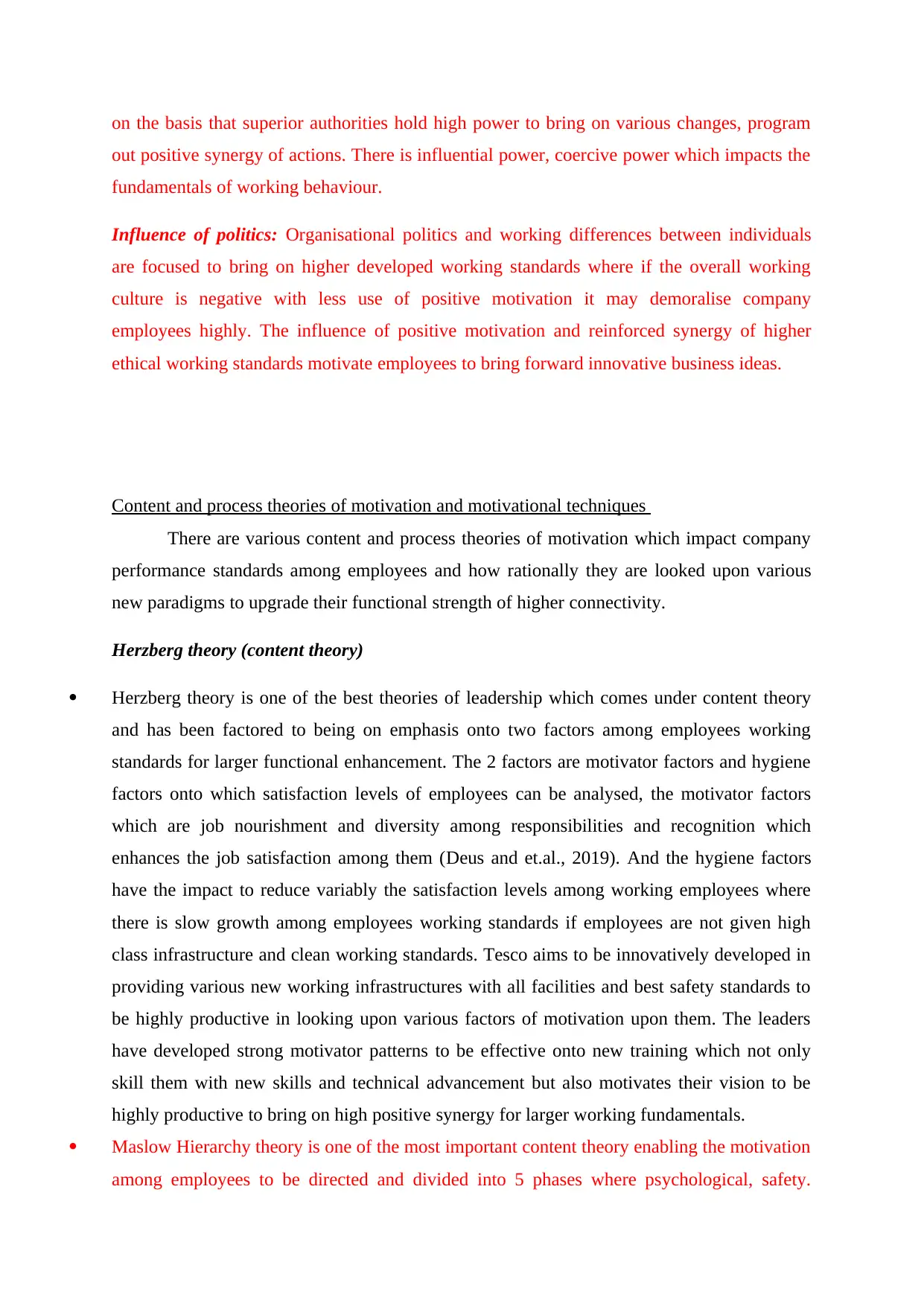
on the basis that superior authorities hold high power to bring on various changes, program
out positive synergy of actions. There is influential power, coercive power which impacts the
fundamentals of working behaviour.
Influence of politics: Organisational politics and working differences between individuals
are focused to bring on higher developed working standards where if the overall working
culture is negative with less use of positive motivation it may demoralise company
employees highly. The influence of positive motivation and reinforced synergy of higher
ethical working standards motivate employees to bring forward innovative business ideas.
Content and process theories of motivation and motivational techniques
There are various content and process theories of motivation which impact company
performance standards among employees and how rationally they are looked upon various
new paradigms to upgrade their functional strength of higher connectivity.
Herzberg theory (content theory)
Herzberg theory is one of the best theories of leadership which comes under content theory
and has been factored to being on emphasis onto two factors among employees working
standards for larger functional enhancement. The 2 factors are motivator factors and hygiene
factors onto which satisfaction levels of employees can be analysed, the motivator factors
which are job nourishment and diversity among responsibilities and recognition which
enhances the job satisfaction among them (Deus and et.al., 2019). And the hygiene factors
have the impact to reduce variably the satisfaction levels among working employees where
there is slow growth among employees working standards if employees are not given high
class infrastructure and clean working standards. Tesco aims to be innovatively developed in
providing various new working infrastructures with all facilities and best safety standards to
be highly productive in looking upon various factors of motivation upon them. The leaders
have developed strong motivator patterns to be effective onto new training which not only
skill them with new skills and technical advancement but also motivates their vision to be
highly productive to bring on high positive synergy for larger working fundamentals.
Maslow Hierarchy theory is one of the most important content theory enabling the motivation
among employees to be directed and divided into 5 phases where psychological, safety.
out positive synergy of actions. There is influential power, coercive power which impacts the
fundamentals of working behaviour.
Influence of politics: Organisational politics and working differences between individuals
are focused to bring on higher developed working standards where if the overall working
culture is negative with less use of positive motivation it may demoralise company
employees highly. The influence of positive motivation and reinforced synergy of higher
ethical working standards motivate employees to bring forward innovative business ideas.
Content and process theories of motivation and motivational techniques
There are various content and process theories of motivation which impact company
performance standards among employees and how rationally they are looked upon various
new paradigms to upgrade their functional strength of higher connectivity.
Herzberg theory (content theory)
Herzberg theory is one of the best theories of leadership which comes under content theory
and has been factored to being on emphasis onto two factors among employees working
standards for larger functional enhancement. The 2 factors are motivator factors and hygiene
factors onto which satisfaction levels of employees can be analysed, the motivator factors
which are job nourishment and diversity among responsibilities and recognition which
enhances the job satisfaction among them (Deus and et.al., 2019). And the hygiene factors
have the impact to reduce variably the satisfaction levels among working employees where
there is slow growth among employees working standards if employees are not given high
class infrastructure and clean working standards. Tesco aims to be innovatively developed in
providing various new working infrastructures with all facilities and best safety standards to
be highly productive in looking upon various factors of motivation upon them. The leaders
have developed strong motivator patterns to be effective onto new training which not only
skill them with new skills and technical advancement but also motivates their vision to be
highly productive to bring on high positive synergy for larger working fundamentals.
Maslow Hierarchy theory is one of the most important content theory enabling the motivation
among employees to be directed and divided into 5 phases where psychological, safety.
⊘ This is a preview!⊘
Do you want full access?
Subscribe today to unlock all pages.

Trusted by 1+ million students worldwide
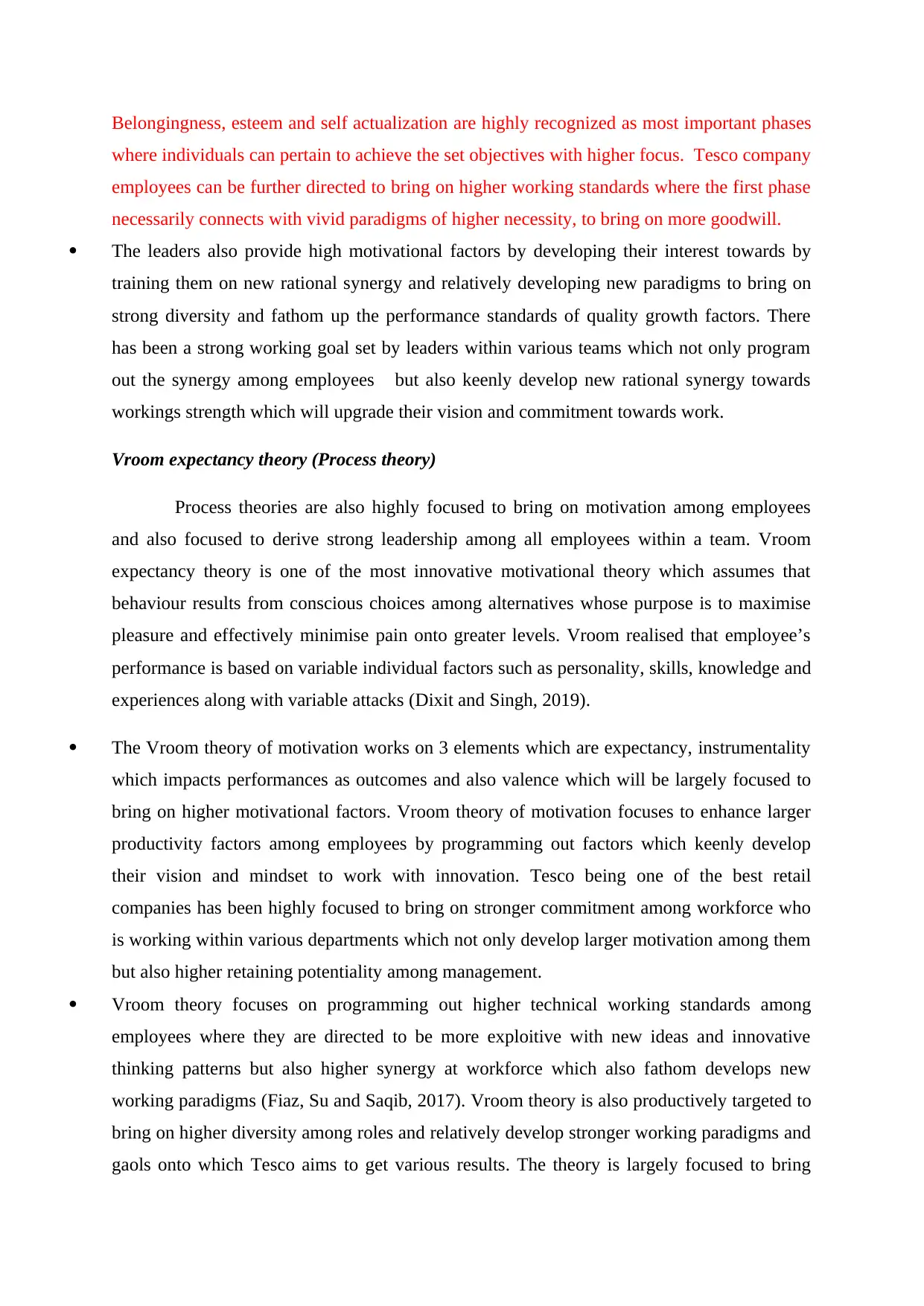
Belongingness, esteem and self actualization are highly recognized as most important phases
where individuals can pertain to achieve the set objectives with higher focus. Tesco company
employees can be further directed to bring on higher working standards where the first phase
necessarily connects with vivid paradigms of higher necessity, to bring on more goodwill.
The leaders also provide high motivational factors by developing their interest towards by
training them on new rational synergy and relatively developing new paradigms to bring on
strong diversity and fathom up the performance standards of quality growth factors. There
has been a strong working goal set by leaders within various teams which not only program
out the synergy among employees but also keenly develop new rational synergy towards
workings strength which will upgrade their vision and commitment towards work.
Vroom expectancy theory (Process theory)
Process theories are also highly focused to bring on motivation among employees
and also focused to derive strong leadership among all employees within a team. Vroom
expectancy theory is one of the most innovative motivational theory which assumes that
behaviour results from conscious choices among alternatives whose purpose is to maximise
pleasure and effectively minimise pain onto greater levels. Vroom realised that employee’s
performance is based on variable individual factors such as personality, skills, knowledge and
experiences along with variable attacks (Dixit and Singh, 2019).
The Vroom theory of motivation works on 3 elements which are expectancy, instrumentality
which impacts performances as outcomes and also valence which will be largely focused to
bring on higher motivational factors. Vroom theory of motivation focuses to enhance larger
productivity factors among employees by programming out factors which keenly develop
their vision and mindset to work with innovation. Tesco being one of the best retail
companies has been highly focused to bring on stronger commitment among workforce who
is working within various departments which not only develop larger motivation among them
but also higher retaining potentiality among management.
Vroom theory focuses on programming out higher technical working standards among
employees where they are directed to be more exploitive with new ideas and innovative
thinking patterns but also higher synergy at workforce which also fathom develops new
working paradigms (Fiaz, Su and Saqib, 2017). Vroom theory is also productively targeted to
bring on higher diversity among roles and relatively develop stronger working paradigms and
gaols onto which Tesco aims to get various results. The theory is largely focused to bring
where individuals can pertain to achieve the set objectives with higher focus. Tesco company
employees can be further directed to bring on higher working standards where the first phase
necessarily connects with vivid paradigms of higher necessity, to bring on more goodwill.
The leaders also provide high motivational factors by developing their interest towards by
training them on new rational synergy and relatively developing new paradigms to bring on
strong diversity and fathom up the performance standards of quality growth factors. There
has been a strong working goal set by leaders within various teams which not only program
out the synergy among employees but also keenly develop new rational synergy towards
workings strength which will upgrade their vision and commitment towards work.
Vroom expectancy theory (Process theory)
Process theories are also highly focused to bring on motivation among employees
and also focused to derive strong leadership among all employees within a team. Vroom
expectancy theory is one of the most innovative motivational theory which assumes that
behaviour results from conscious choices among alternatives whose purpose is to maximise
pleasure and effectively minimise pain onto greater levels. Vroom realised that employee’s
performance is based on variable individual factors such as personality, skills, knowledge and
experiences along with variable attacks (Dixit and Singh, 2019).
The Vroom theory of motivation works on 3 elements which are expectancy, instrumentality
which impacts performances as outcomes and also valence which will be largely focused to
bring on higher motivational factors. Vroom theory of motivation focuses to enhance larger
productivity factors among employees by programming out factors which keenly develop
their vision and mindset to work with innovation. Tesco being one of the best retail
companies has been highly focused to bring on stronger commitment among workforce who
is working within various departments which not only develop larger motivation among them
but also higher retaining potentiality among management.
Vroom theory focuses on programming out higher technical working standards among
employees where they are directed to be more exploitive with new ideas and innovative
thinking patterns but also higher synergy at workforce which also fathom develops new
working paradigms (Fiaz, Su and Saqib, 2017). Vroom theory is also productively targeted to
bring on higher diversity among roles and relatively develop stronger working paradigms and
gaols onto which Tesco aims to get various results. The theory is largely focused to bring
Paraphrase This Document
Need a fresh take? Get an instant paraphrase of this document with our AI Paraphraser
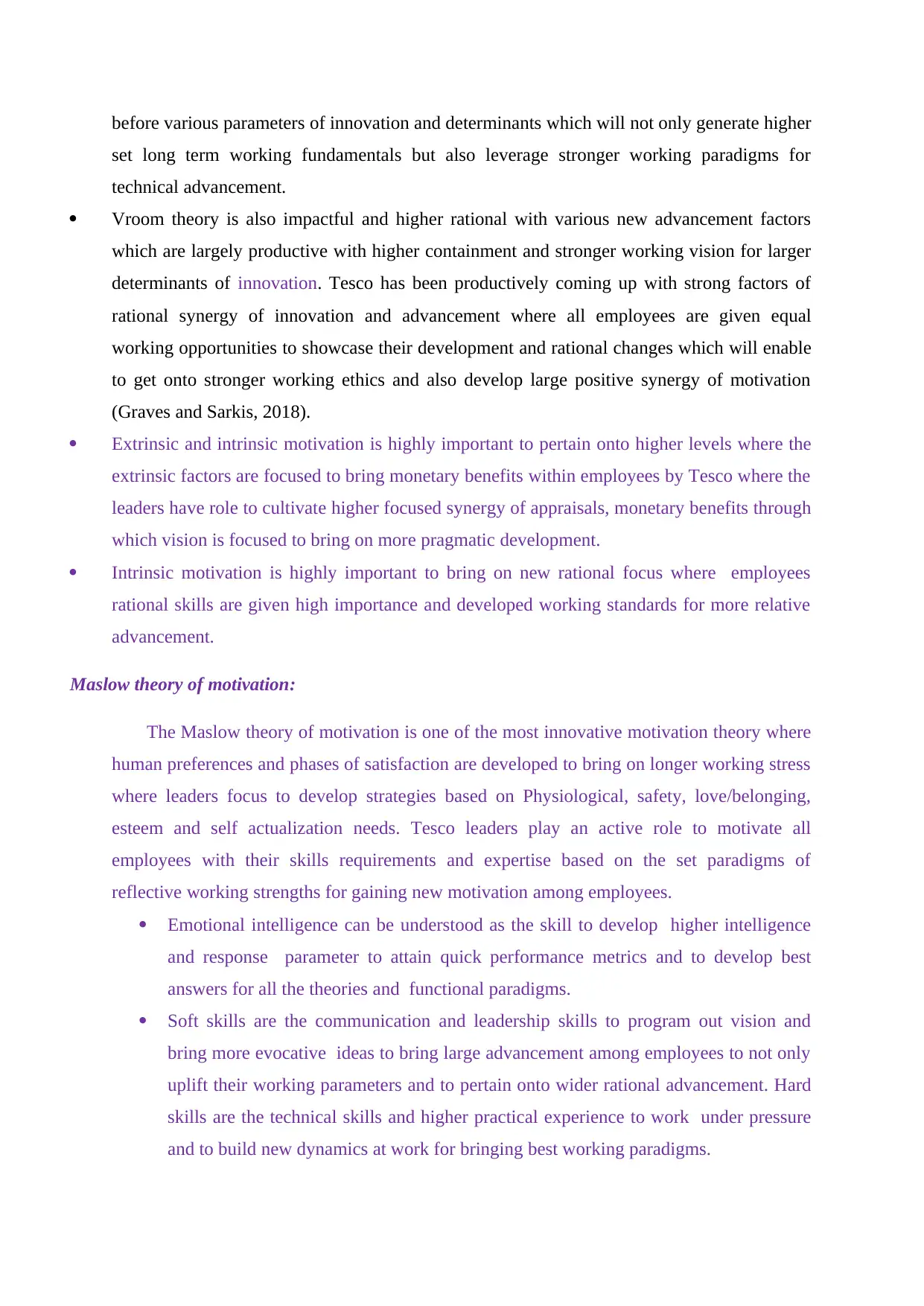
before various parameters of innovation and determinants which will not only generate higher
set long term working fundamentals but also leverage stronger working paradigms for
technical advancement.
Vroom theory is also impactful and higher rational with various new advancement factors
which are largely productive with higher containment and stronger working vision for larger
determinants of innovation. Tesco has been productively coming up with strong factors of
rational synergy of innovation and advancement where all employees are given equal
working opportunities to showcase their development and rational changes which will enable
to get onto stronger working ethics and also develop large positive synergy of motivation
(Graves and Sarkis, 2018).
Extrinsic and intrinsic motivation is highly important to pertain onto higher levels where the
extrinsic factors are focused to bring monetary benefits within employees by Tesco where the
leaders have role to cultivate higher focused synergy of appraisals, monetary benefits through
which vision is focused to bring on more pragmatic development.
Intrinsic motivation is highly important to bring on new rational focus where employees
rational skills are given high importance and developed working standards for more relative
advancement.
Maslow theory of motivation:
The Maslow theory of motivation is one of the most innovative motivation theory where
human preferences and phases of satisfaction are developed to bring on longer working stress
where leaders focus to develop strategies based on Physiological, safety, love/belonging,
esteem and self actualization needs. Tesco leaders play an active role to motivate all
employees with their skills requirements and expertise based on the set paradigms of
reflective working strengths for gaining new motivation among employees.
Emotional intelligence can be understood as the skill to develop higher intelligence
and response parameter to attain quick performance metrics and to develop best
answers for all the theories and functional paradigms.
Soft skills are the communication and leadership skills to program out vision and
bring more evocative ideas to bring large advancement among employees to not only
uplift their working parameters and to pertain onto wider rational advancement. Hard
skills are the technical skills and higher practical experience to work under pressure
and to build new dynamics at work for bringing best working paradigms.
set long term working fundamentals but also leverage stronger working paradigms for
technical advancement.
Vroom theory is also impactful and higher rational with various new advancement factors
which are largely productive with higher containment and stronger working vision for larger
determinants of innovation. Tesco has been productively coming up with strong factors of
rational synergy of innovation and advancement where all employees are given equal
working opportunities to showcase their development and rational changes which will enable
to get onto stronger working ethics and also develop large positive synergy of motivation
(Graves and Sarkis, 2018).
Extrinsic and intrinsic motivation is highly important to pertain onto higher levels where the
extrinsic factors are focused to bring monetary benefits within employees by Tesco where the
leaders have role to cultivate higher focused synergy of appraisals, monetary benefits through
which vision is focused to bring on more pragmatic development.
Intrinsic motivation is highly important to bring on new rational focus where employees
rational skills are given high importance and developed working standards for more relative
advancement.
Maslow theory of motivation:
The Maslow theory of motivation is one of the most innovative motivation theory where
human preferences and phases of satisfaction are developed to bring on longer working stress
where leaders focus to develop strategies based on Physiological, safety, love/belonging,
esteem and self actualization needs. Tesco leaders play an active role to motivate all
employees with their skills requirements and expertise based on the set paradigms of
reflective working strengths for gaining new motivation among employees.
Emotional intelligence can be understood as the skill to develop higher intelligence
and response parameter to attain quick performance metrics and to develop best
answers for all the theories and functional paradigms.
Soft skills are the communication and leadership skills to program out vision and
bring more evocative ideas to bring large advancement among employees to not only
uplift their working parameters and to pertain onto wider rational advancement. Hard
skills are the technical skills and higher practical experience to work under pressure
and to build new dynamics at work for bringing best working paradigms.
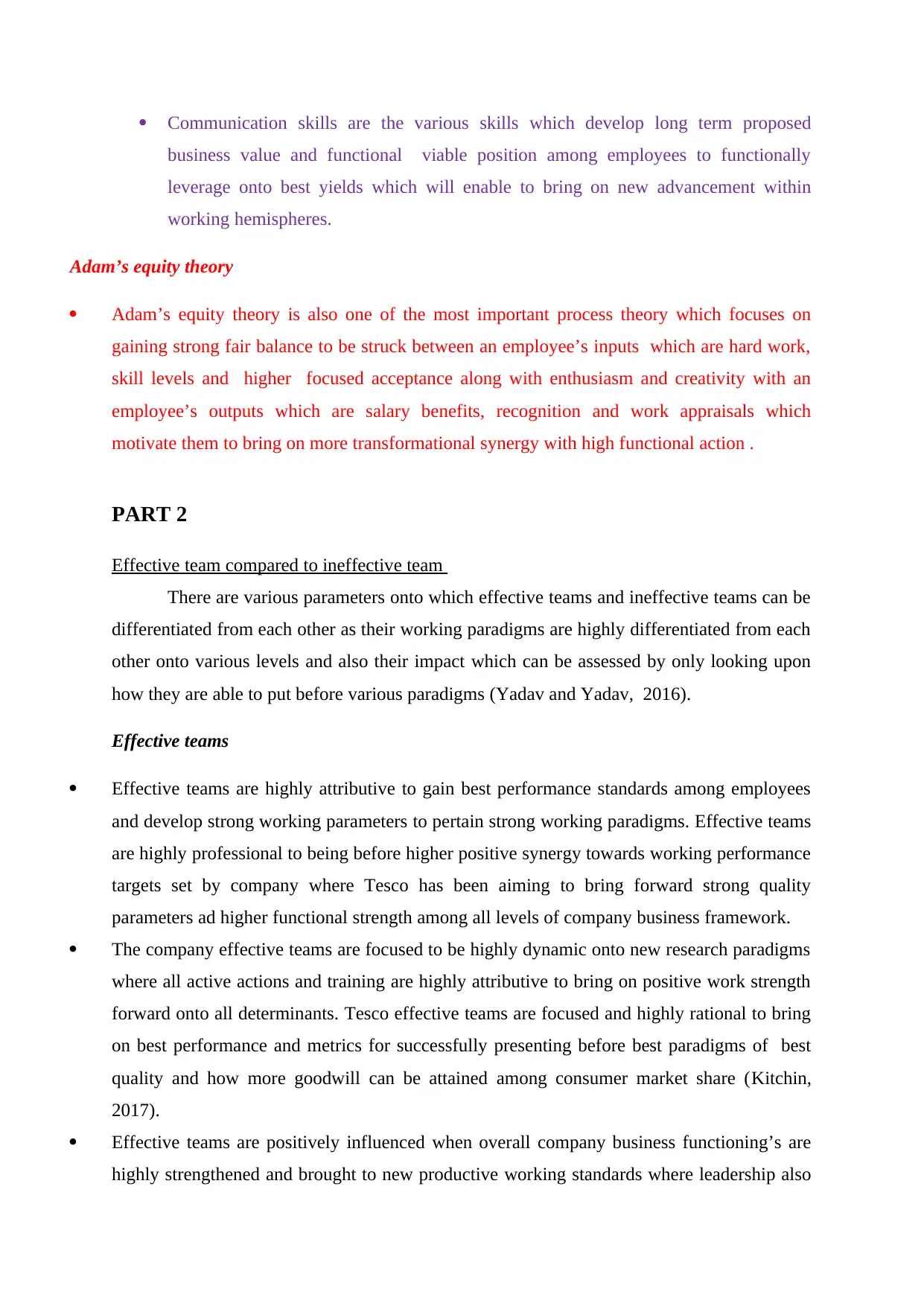
Communication skills are the various skills which develop long term proposed
business value and functional viable position among employees to functionally
leverage onto best yields which will enable to bring on new advancement within
working hemispheres.
Adam’s equity theory
Adam’s equity theory is also one of the most important process theory which focuses on
gaining strong fair balance to be struck between an employee’s inputs which are hard work,
skill levels and higher focused acceptance along with enthusiasm and creativity with an
employee’s outputs which are salary benefits, recognition and work appraisals which
motivate them to bring on more transformational synergy with high functional action .
PART 2
Effective team compared to ineffective team
There are various parameters onto which effective teams and ineffective teams can be
differentiated from each other as their working paradigms are highly differentiated from each
other onto various levels and also their impact which can be assessed by only looking upon
how they are able to put before various paradigms (Yadav and Yadav, 2016).
Effective teams
Effective teams are highly attributive to gain best performance standards among employees
and develop strong working parameters to pertain strong working paradigms. Effective teams
are highly professional to being before higher positive synergy towards working performance
targets set by company where Tesco has been aiming to bring forward strong quality
parameters ad higher functional strength among all levels of company business framework.
The company effective teams are focused to be highly dynamic onto new research paradigms
where all active actions and training are highly attributive to bring on positive work strength
forward onto all determinants. Tesco effective teams are focused and highly rational to bring
on best performance and metrics for successfully presenting before best paradigms of best
quality and how more goodwill can be attained among consumer market share (Kitchin,
2017).
Effective teams are positively influenced when overall company business functioning’s are
highly strengthened and brought to new productive working standards where leadership also
business value and functional viable position among employees to functionally
leverage onto best yields which will enable to bring on new advancement within
working hemispheres.
Adam’s equity theory
Adam’s equity theory is also one of the most important process theory which focuses on
gaining strong fair balance to be struck between an employee’s inputs which are hard work,
skill levels and higher focused acceptance along with enthusiasm and creativity with an
employee’s outputs which are salary benefits, recognition and work appraisals which
motivate them to bring on more transformational synergy with high functional action .
PART 2
Effective team compared to ineffective team
There are various parameters onto which effective teams and ineffective teams can be
differentiated from each other as their working paradigms are highly differentiated from each
other onto various levels and also their impact which can be assessed by only looking upon
how they are able to put before various paradigms (Yadav and Yadav, 2016).
Effective teams
Effective teams are highly attributive to gain best performance standards among employees
and develop strong working parameters to pertain strong working paradigms. Effective teams
are highly professional to being before higher positive synergy towards working performance
targets set by company where Tesco has been aiming to bring forward strong quality
parameters ad higher functional strength among all levels of company business framework.
The company effective teams are focused to be highly dynamic onto new research paradigms
where all active actions and training are highly attributive to bring on positive work strength
forward onto all determinants. Tesco effective teams are focused and highly rational to bring
on best performance and metrics for successfully presenting before best paradigms of best
quality and how more goodwill can be attained among consumer market share (Kitchin,
2017).
Effective teams are positively influenced when overall company business functioning’s are
highly strengthened and brought to new productive working standards where leadership also
⊘ This is a preview!⊘
Do you want full access?
Subscribe today to unlock all pages.

Trusted by 1+ million students worldwide
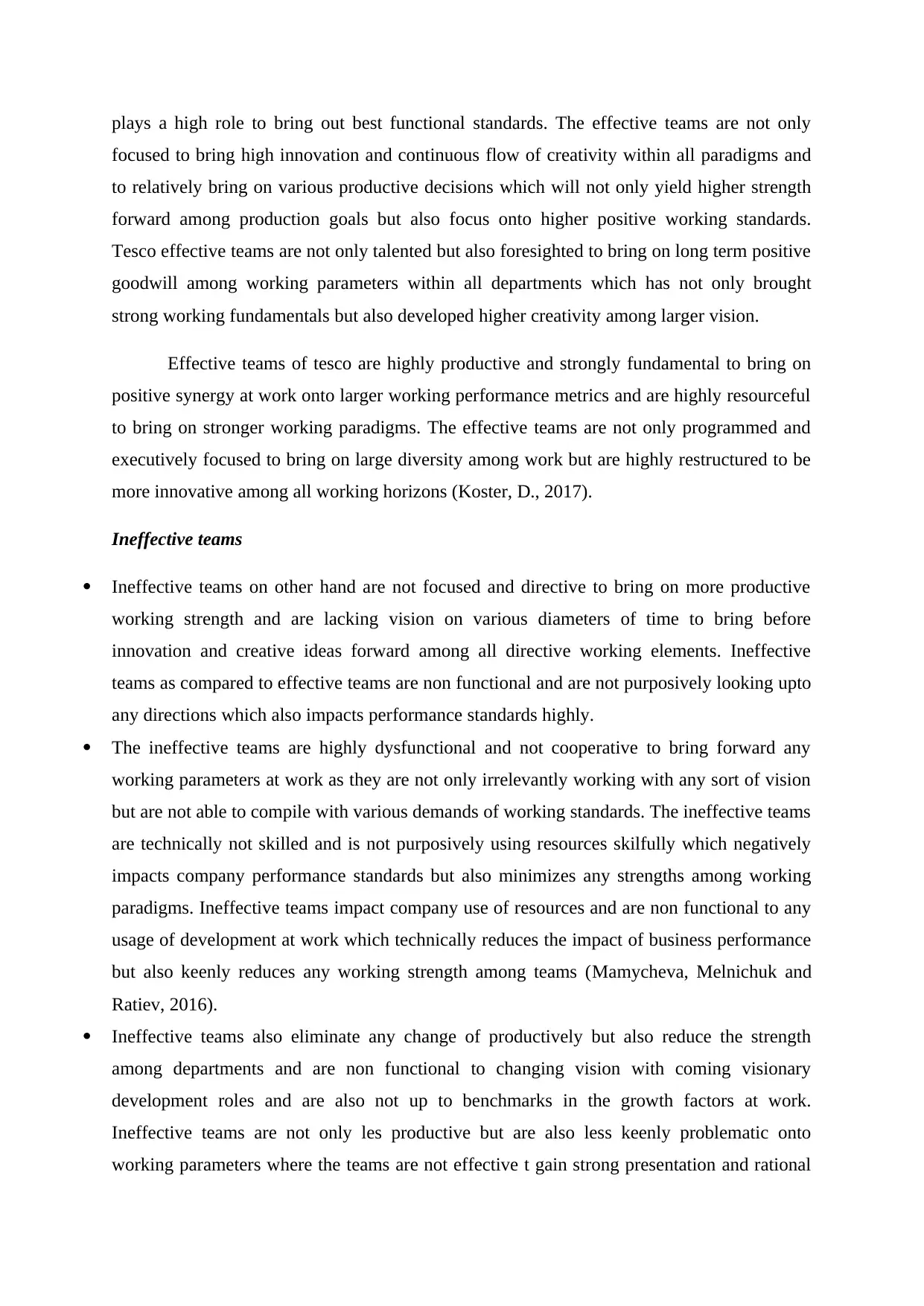
plays a high role to bring out best functional standards. The effective teams are not only
focused to bring high innovation and continuous flow of creativity within all paradigms and
to relatively bring on various productive decisions which will not only yield higher strength
forward among production goals but also focus onto higher positive working standards.
Tesco effective teams are not only talented but also foresighted to bring on long term positive
goodwill among working parameters within all departments which has not only brought
strong working fundamentals but also developed higher creativity among larger vision.
Effective teams of tesco are highly productive and strongly fundamental to bring on
positive synergy at work onto larger working performance metrics and are highly resourceful
to bring on stronger working paradigms. The effective teams are not only programmed and
executively focused to bring on large diversity among work but are highly restructured to be
more innovative among all working horizons (Koster, D., 2017).
Ineffective teams
Ineffective teams on other hand are not focused and directive to bring on more productive
working strength and are lacking vision on various diameters of time to bring before
innovation and creative ideas forward among all directive working elements. Ineffective
teams as compared to effective teams are non functional and are not purposively looking upto
any directions which also impacts performance standards highly.
The ineffective teams are highly dysfunctional and not cooperative to bring forward any
working parameters at work as they are not only irrelevantly working with any sort of vision
but are not able to compile with various demands of working standards. The ineffective teams
are technically not skilled and is not purposively using resources skilfully which negatively
impacts company performance standards but also minimizes any strengths among working
paradigms. Ineffective teams impact company use of resources and are non functional to any
usage of development at work which technically reduces the impact of business performance
but also keenly reduces any working strength among teams (Mamycheva, Melnichuk and
Ratiev, 2016).
Ineffective teams also eliminate any change of productively but also reduce the strength
among departments and are non functional to changing vision with coming visionary
development roles and are also not up to benchmarks in the growth factors at work.
Ineffective teams are not only les productive but are also less keenly problematic onto
working parameters where the teams are not effective t gain strong presentation and rational
focused to bring high innovation and continuous flow of creativity within all paradigms and
to relatively bring on various productive decisions which will not only yield higher strength
forward among production goals but also focus onto higher positive working standards.
Tesco effective teams are not only talented but also foresighted to bring on long term positive
goodwill among working parameters within all departments which has not only brought
strong working fundamentals but also developed higher creativity among larger vision.
Effective teams of tesco are highly productive and strongly fundamental to bring on
positive synergy at work onto larger working performance metrics and are highly resourceful
to bring on stronger working paradigms. The effective teams are not only programmed and
executively focused to bring on large diversity among work but are highly restructured to be
more innovative among all working horizons (Koster, D., 2017).
Ineffective teams
Ineffective teams on other hand are not focused and directive to bring on more productive
working strength and are lacking vision on various diameters of time to bring before
innovation and creative ideas forward among all directive working elements. Ineffective
teams as compared to effective teams are non functional and are not purposively looking upto
any directions which also impacts performance standards highly.
The ineffective teams are highly dysfunctional and not cooperative to bring forward any
working parameters at work as they are not only irrelevantly working with any sort of vision
but are not able to compile with various demands of working standards. The ineffective teams
are technically not skilled and is not purposively using resources skilfully which negatively
impacts company performance standards but also minimizes any strengths among working
paradigms. Ineffective teams impact company use of resources and are non functional to any
usage of development at work which technically reduces the impact of business performance
but also keenly reduces any working strength among teams (Mamycheva, Melnichuk and
Ratiev, 2016).
Ineffective teams also eliminate any change of productively but also reduce the strength
among departments and are non functional to changing vision with coming visionary
development roles and are also not up to benchmarks in the growth factors at work.
Ineffective teams are not only les productive but are also less keenly problematic onto
working parameters where the teams are not effective t gain strong presentation and rational
Paraphrase This Document
Need a fresh take? Get an instant paraphrase of this document with our AI Paraphraser
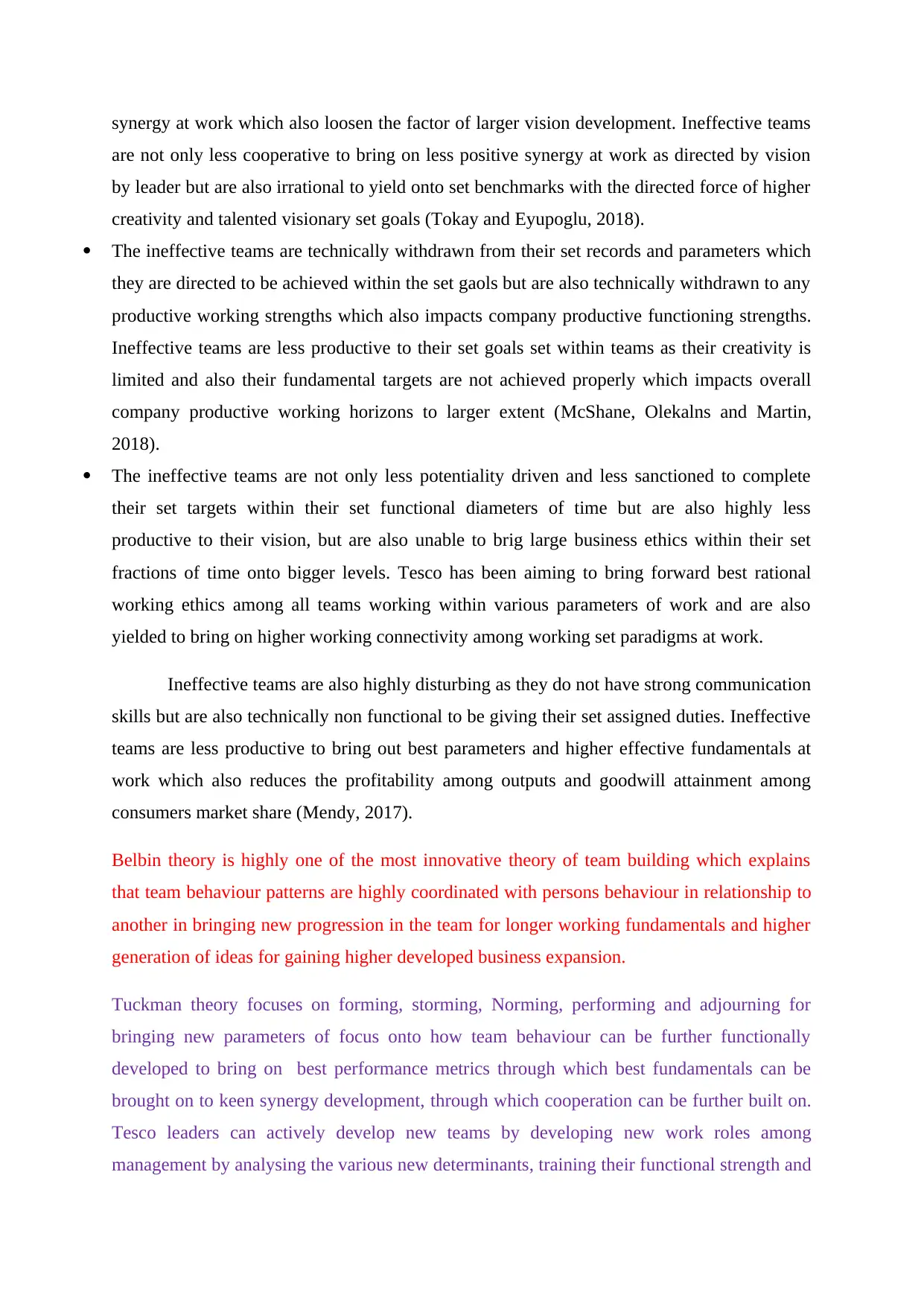
synergy at work which also loosen the factor of larger vision development. Ineffective teams
are not only less cooperative to bring on less positive synergy at work as directed by vision
by leader but are also irrational to yield onto set benchmarks with the directed force of higher
creativity and talented visionary set goals (Tokay and Eyupoglu, 2018).
The ineffective teams are technically withdrawn from their set records and parameters which
they are directed to be achieved within the set gaols but are also technically withdrawn to any
productive working strengths which also impacts company productive functioning strengths.
Ineffective teams are less productive to their set goals set within teams as their creativity is
limited and also their fundamental targets are not achieved properly which impacts overall
company productive working horizons to larger extent (McShane, Olekalns and Martin,
2018).
The ineffective teams are not only less potentiality driven and less sanctioned to complete
their set targets within their set functional diameters of time but are also highly less
productive to their vision, but are also unable to brig large business ethics within their set
fractions of time onto bigger levels. Tesco has been aiming to bring forward best rational
working ethics among all teams working within various parameters of work and are also
yielded to bring on higher working connectivity among working set paradigms at work.
Ineffective teams are also highly disturbing as they do not have strong communication
skills but are also technically non functional to be giving their set assigned duties. Ineffective
teams are less productive to bring out best parameters and higher effective fundamentals at
work which also reduces the profitability among outputs and goodwill attainment among
consumers market share (Mendy, 2017).
Belbin theory is highly one of the most innovative theory of team building which explains
that team behaviour patterns are highly coordinated with persons behaviour in relationship to
another in bringing new progression in the team for longer working fundamentals and higher
generation of ideas for gaining higher developed business expansion.
Tuckman theory focuses on forming, storming, Norming, performing and adjourning for
bringing new parameters of focus onto how team behaviour can be further functionally
developed to bring on best performance metrics through which best fundamentals can be
brought on to keen synergy development, through which cooperation can be further built on.
Tesco leaders can actively develop new teams by developing new work roles among
management by analysing the various new determinants, training their functional strength and
are not only less cooperative to bring on less positive synergy at work as directed by vision
by leader but are also irrational to yield onto set benchmarks with the directed force of higher
creativity and talented visionary set goals (Tokay and Eyupoglu, 2018).
The ineffective teams are technically withdrawn from their set records and parameters which
they are directed to be achieved within the set gaols but are also technically withdrawn to any
productive working strengths which also impacts company productive functioning strengths.
Ineffective teams are less productive to their set goals set within teams as their creativity is
limited and also their fundamental targets are not achieved properly which impacts overall
company productive working horizons to larger extent (McShane, Olekalns and Martin,
2018).
The ineffective teams are not only less potentiality driven and less sanctioned to complete
their set targets within their set functional diameters of time but are also highly less
productive to their vision, but are also unable to brig large business ethics within their set
fractions of time onto bigger levels. Tesco has been aiming to bring forward best rational
working ethics among all teams working within various parameters of work and are also
yielded to bring on higher working connectivity among working set paradigms at work.
Ineffective teams are also highly disturbing as they do not have strong communication
skills but are also technically non functional to be giving their set assigned duties. Ineffective
teams are less productive to bring out best parameters and higher effective fundamentals at
work which also reduces the profitability among outputs and goodwill attainment among
consumers market share (Mendy, 2017).
Belbin theory is highly one of the most innovative theory of team building which explains
that team behaviour patterns are highly coordinated with persons behaviour in relationship to
another in bringing new progression in the team for longer working fundamentals and higher
generation of ideas for gaining higher developed business expansion.
Tuckman theory focuses on forming, storming, Norming, performing and adjourning for
bringing new parameters of focus onto how team behaviour can be further functionally
developed to bring on best performance metrics through which best fundamentals can be
brought on to keen synergy development, through which cooperation can be further built on.
Tesco leaders can actively develop new teams by developing new work roles among
management by analysing the various new determinants, training their functional strength and
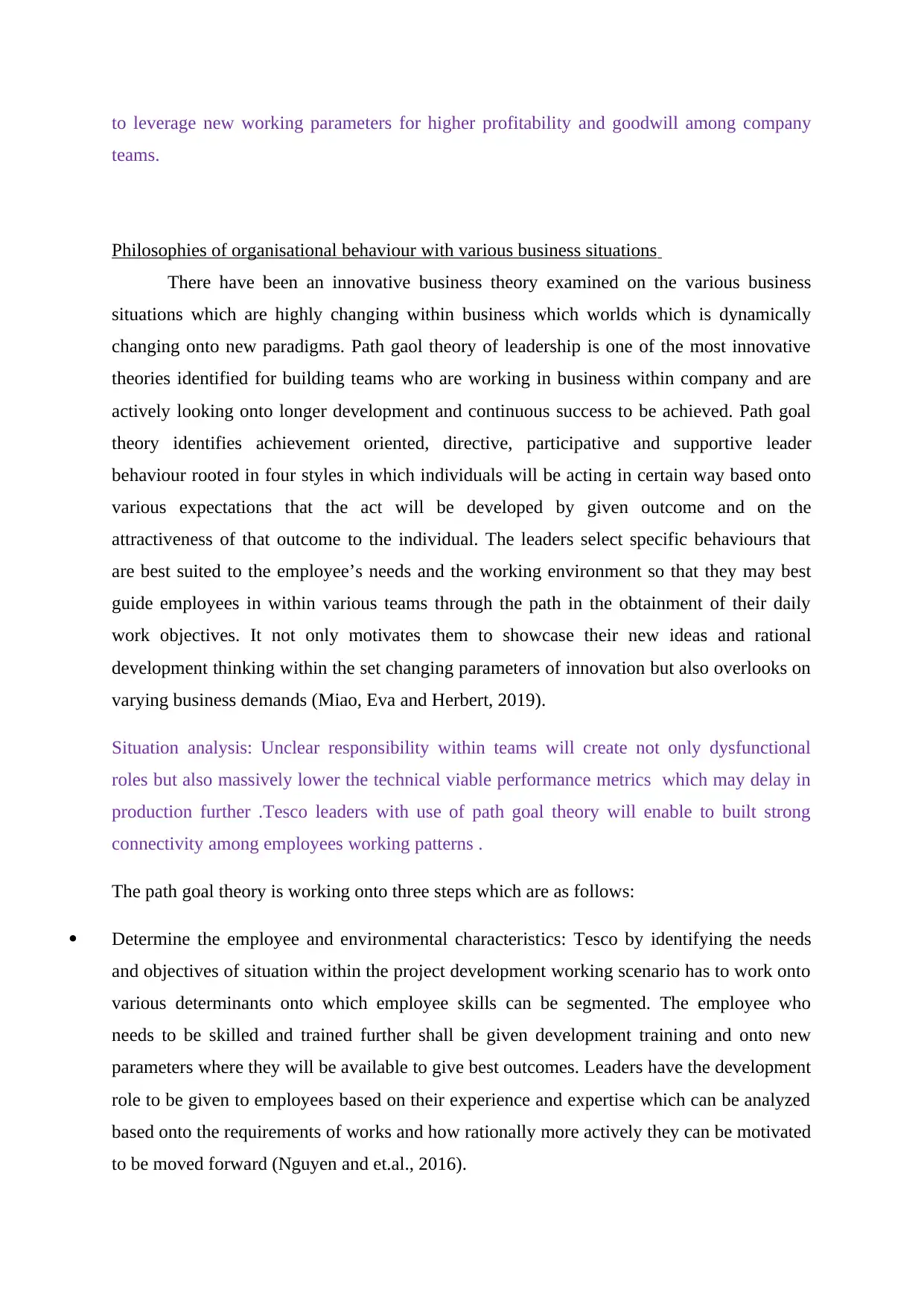
to leverage new working parameters for higher profitability and goodwill among company
teams.
Philosophies of organisational behaviour with various business situations
There have been an innovative business theory examined on the various business
situations which are highly changing within business which worlds which is dynamically
changing onto new paradigms. Path gaol theory of leadership is one of the most innovative
theories identified for building teams who are working in business within company and are
actively looking onto longer development and continuous success to be achieved. Path goal
theory identifies achievement oriented, directive, participative and supportive leader
behaviour rooted in four styles in which individuals will be acting in certain way based onto
various expectations that the act will be developed by given outcome and on the
attractiveness of that outcome to the individual. The leaders select specific behaviours that
are best suited to the employee’s needs and the working environment so that they may best
guide employees in within various teams through the path in the obtainment of their daily
work objectives. It not only motivates them to showcase their new ideas and rational
development thinking within the set changing parameters of innovation but also overlooks on
varying business demands (Miao, Eva and Herbert, 2019).
Situation analysis: Unclear responsibility within teams will create not only dysfunctional
roles but also massively lower the technical viable performance metrics which may delay in
production further .Tesco leaders with use of path goal theory will enable to built strong
connectivity among employees working patterns .
The path goal theory is working onto three steps which are as follows:
Determine the employee and environmental characteristics: Tesco by identifying the needs
and objectives of situation within the project development working scenario has to work onto
various determinants onto which employee skills can be segmented. The employee who
needs to be skilled and trained further shall be given development training and onto new
parameters where they will be available to give best outcomes. Leaders have the development
role to be given to employees based on their experience and expertise which can be analyzed
based onto the requirements of works and how rationally more actively they can be motivated
to be moved forward (Nguyen and et.al., 2016).
teams.
Philosophies of organisational behaviour with various business situations
There have been an innovative business theory examined on the various business
situations which are highly changing within business which worlds which is dynamically
changing onto new paradigms. Path gaol theory of leadership is one of the most innovative
theories identified for building teams who are working in business within company and are
actively looking onto longer development and continuous success to be achieved. Path goal
theory identifies achievement oriented, directive, participative and supportive leader
behaviour rooted in four styles in which individuals will be acting in certain way based onto
various expectations that the act will be developed by given outcome and on the
attractiveness of that outcome to the individual. The leaders select specific behaviours that
are best suited to the employee’s needs and the working environment so that they may best
guide employees in within various teams through the path in the obtainment of their daily
work objectives. It not only motivates them to showcase their new ideas and rational
development thinking within the set changing parameters of innovation but also overlooks on
varying business demands (Miao, Eva and Herbert, 2019).
Situation analysis: Unclear responsibility within teams will create not only dysfunctional
roles but also massively lower the technical viable performance metrics which may delay in
production further .Tesco leaders with use of path goal theory will enable to built strong
connectivity among employees working patterns .
The path goal theory is working onto three steps which are as follows:
Determine the employee and environmental characteristics: Tesco by identifying the needs
and objectives of situation within the project development working scenario has to work onto
various determinants onto which employee skills can be segmented. The employee who
needs to be skilled and trained further shall be given development training and onto new
parameters where they will be available to give best outcomes. Leaders have the development
role to be given to employees based on their experience and expertise which can be analyzed
based onto the requirements of works and how rationally more actively they can be motivated
to be moved forward (Nguyen and et.al., 2016).
⊘ This is a preview!⊘
Do you want full access?
Subscribe today to unlock all pages.

Trusted by 1+ million students worldwide
1 out of 16
Related Documents
Your All-in-One AI-Powered Toolkit for Academic Success.
+13062052269
info@desklib.com
Available 24*7 on WhatsApp / Email
![[object Object]](/_next/static/media/star-bottom.7253800d.svg)
Unlock your academic potential
Copyright © 2020–2026 A2Z Services. All Rights Reserved. Developed and managed by ZUCOL.





